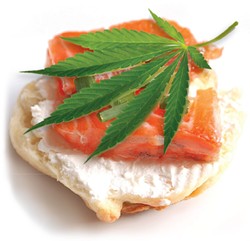A recent report by the Guardian shows that alcohol sales in Colorado grew in the years after the state legalized recreational pot, seemingly dispelling an argument that pot advocates have made that alcohol consumption would decrease with easier access to marijuana.
It's unclear if possible alcohol temperance was a selling point for Colorado voters, but the prediction has led to fears in the alcohol industry as legalization spreads through the U.S. In Colorado, those concerns have all but vanished. Alcohol excise tax revenues rose 2.1 percent from June 2014 to May 2015, and brewers and retailers in the state have confirmed growth in sales.
While some studies indicated that consumers think pot can replace alcohol, it seems sort of obvious, in retrospect, that legal weed wouldn't cut into Americans' appetite for booze. Anyone who's stumbled upon a disc golf course, for example, would know that desire for the inebriants isn't mutually exclusive.
And some in Colorado are saying legal marijuana is drawing tourists, which is good for sales — a New Belgium Brewing Co. spokesman suggested that there's an overlap between people who enjoy craft beer and high quality marijuana. With impending legalization in California, this could be good news. Craft beer and quality pot are languages that Humboldt County speaks.
•

I mean, edible THC delivery is fine. Smoke's bad for us. But how about a nice pill or tincture or lozenge? Something with a measurable dose? Something that isn't linked to a vital function, like nutrition? (Let's put aside, for a moment, the irony of infusing salmon with pot — the marriage of two of the North Coast's most precious resources that are increasingly at odds over scarce water.)
I've never really understood the appeal of ganja food, except as subterfuge for getting high in a campout festival or some such restricted area. Ingested weed takes time to kick in, lasts much longer and can lead to unpredictable results. Nowadays, legit manufacturers seem to be getting a handle on dosages, but still — a marijuana-lox bagel?
That's Pollack's vision. He launched his stoney seafood on 4/20, and told the Guardian it "was a little strong." He's been guinea pigging customers at his deli ever since, "getting more calculated" each time he makes it in order to meet Colorado's dosage standards. Sounds like the scientific rigor you'd expect from your line cook-cum-pharmacists.
•
On the actual scientific rigor front, German researchers have engineered yeast that produces THC, according to the New York Times. Coaxing desirable medications out of yeast is a thing right now, apparently — researchers got the micororganisms to produce hydrocodone in August — but it's nothing new. After all, people have been coaxing alcohol out of yeast for thousands of years.
As the Times reports, there's interest in utilizing those most irie of yeasts to brew beer, but the researchers involved see more medically inclined applications for the breakthrough. And anyone who visited the Humboldt Homebrew Festival this year knows you don't need a German lab to get THC into your bottle of beer.
Perhaps the most interesting aspect of the Times report is the admission by one researcher on the project that synthetic production of yeast is kind of a dead-end. After years of careful hybridization, some cannabis plants yield 30 percent THC content, according to the article, making it an efficient producer of the compound.
"Right now, we have a plant that is essentially the Ferrari of the plant world when it comes to producing the chemical of interest," Jonathan Page told the Times. "Cannabis is hard to beat."
Comments